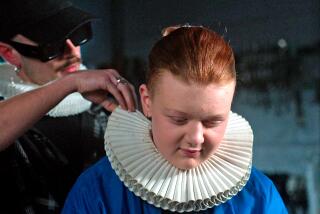FILM : ‘Dona Flor’: Marriage’s Good, Bed and Ugly
- Share via
Is a woman’s ideal man a hybrid of the steady, dependable clerk and the passionate, unpredictable Romeo, the kind of guy who can put the kids to bed one moment and put his wife to bed the next?
That’s pretty much the idea behind “Dona Flor and Her Two Husbands,” Bruno Barreto’s sly adaptation of Jorge Amado’s influential Brazilian novel. In the 1978 movie, screening at UC Irvine Friday as part of the “offbeat comedy series,” Dona Flor faces the conundrum of sexual domesticity head on, hilariously conflicted by her need for both fire and a fire extinguisher.
Played by Sonia Braga with an eroticism that is somehow both primal and pristine (she’s a whiz at conveying the desire under the still, reserved surface), Dona Flor is married to Vadinho (Jose Wilker) at the film’s outset. He’s a boozing, woman-chaser who steals his wife’s money but makes delirious love to her at night. She loves that last part.
But he dies after a day of excess during carnival, and she remarries. Teodoro (Mauro Mendonca), the local druggist, is a respectable sort with only one vice, playing classical music, rather unevenly, on his oboe. He’s dedicated to Dona Flor, but it’s all so ordinary. Even between the sheets.
Things move slowly in her life until she starts thinking about Vadinho, and Barreto, closely following Amado’s novel, indulges in a little supernatural fancy. Vadinho appears, naked in her bedroom, announcing that Dona Flor has sent for him and his job is to satisfy her, to disrupt her boring tranquility. What to do? Betray her husband with a spirit or be faithful, even in fantasy land. How about a menage a trois ?
To some, all Dona Flor’s yearnings may seem rooted in a sexist point of view (feminists did complain when the movie was first released), but that’s a reactionary take on the film. Actually, “Dona Flor and Her Two Husbands” should be seen as liberating, an unpretentious and uncomplicated slant on desire. There’s a playfully free sway to Amado’s character and the way Braga approaches her that is vital and far distant from exploitative.
The movie is also credited with helping to loosen the reins of cinema censorship in Brazil. With its fairly graphic sex scenes (cinematographer Maurilo Salles follows the mingling bodies with a matter-of-fact interest) and ability to capture the essence of Amado’s novel, “Dona Flor and Her Two Husbands” was a forward step in the country’s filmmaking.
That’s not to say Barreto didn’t miss a few opportunities. He could have brought Vadinho, Teodoro and Dona Flor together earlier, taking fuller comic advantage of the threesome. And his use of flashbacks to tell the tale of Vadinho and Dona Flor is not always graceful. Nonetheless, it’s a jaunty little ode to the pleasures (and confusions) of passion.
What: Bruno Barreto’s “Dona Flor and Her Two Husbands.”
When: Friday, April 26, at 7 and 9 p.m.
Where: UC Irvine’s Student Center Crystal Cove Auditorium.
Whereabouts: Take the San Diego (405) Freeway to Jamboree Road and head south. Go east on Campus Drive to Bridge Road. Take Bridge Road into the campus.
Wherewithal: $4.
Where to Call: (714) 856-6379.
More to Read
Only good movies
Get the Indie Focus newsletter, Mark Olsen's weekly guide to the world of cinema.
You may occasionally receive promotional content from the Los Angeles Times.










